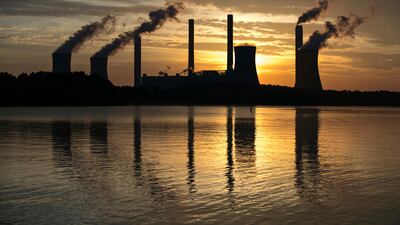Private companies, government agencies and the education sector all have a role to play in helping to tackle climate change, environment officials said as they set out plans to collaborate on a drive aimed at staving off rising temperatures and cutting emissions.
The Ministry of Climate Change & Environment on Tuesday set out three objects that will shape the National Climate Change Plan until 2050: mitigation, adaptation and economic diversification.
“I think we tend to forget that climate change is cross-cutting,” said Shaima Alaydarous, the head of international climate change policy. “It’s not just the Ministry of Climate Change and Environment taking action to address climate change. All other ministries have a role to play, like municipalities, private sector and academia.”
The UAE is a signatory to the Paris Agreement, which seeks to stem the tide of climate change.
Countries that have ratified the agreement are committed to limiting the rise in global average temperatures to 1.5C above pre-industrial levels. At present, the country is predicted to experience a 2C to 3C increase in temperatures by the middle of this century, and 10 per cent rise in humidity.
There are broader and equally worrying concerns for other countries, including rising sea levels.
Over the next year, the ministry will be means coordinating mitigation and adaptation policies between local and federal agencies, large and small businesses. Meetings will identify what action is already being taken to address climate change and what remains to be done in public health, energy, infrastructure and environment.
The reduction of green house gas emissions is one of three key climate priorities to meet these long term objectives.
Discussions over the next 12 months lead to a baseline for targets and policy. The first national adaptation report will be ready by next October. There will be quarterly reports to the Emirates Council for Climate Change and Environment, where there is a representative from every emirate.
On the ground, this will translate to the expansion of green spaces, sustainable construction, sustainable transport and the development of protected areas. Specific targets will be announced at a later date as the ministry works with other government bodies and businesses.
“They’re actually really engaged,” said Fahd Al Hammadi, the director of the ministry’s climate change department. “Even before the national climate change plan was endorsed. They’re ready to engage, they’re ready to invest.”
“What the country is doing can really speak to the expectation of the Paris Agreement. It’s a matter of streamlining what can be done.
“There are a lot of efforts everywhere but we need to bring it in one basket.
“Now we have the vision and direction that we want to achieve when we set the plan. Now we have to work and every entity needs to work.”
A second priority is private investment in sustainable initiatives and research. Two weeks ago, the ministry launched its 'business majlis' series to involve companies in policy development and develop incentives for private investment in projects mitigating climate change and adaptation.
___________
Read More:
CO2 levels ‘are close to point of no return’
Full list of UAE government initiatives
Solutions to climate change puzzle remain elusive
___________
The National Climate Change Plan 2017-2050 was approved by the UAE cabinet in June.
In January, the government announced plans to slash national carbon dioxide emissions by 70 per cent, increase clean energy by 50 per cent and increase efficiency by 40 per cent by the year 2050.

